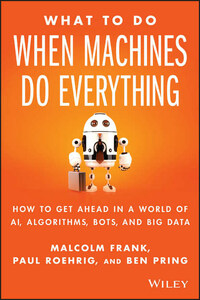Cover image: Kirill_makarov/Shutterstock.com
Cover design: theBookDesigners
Copyright © 2017 by Cognizant Technology Solutions U.S. Corporation. All rights reserved
Published by John Wiley & Sons, Inc., Hoboken, New Jersey
Published simultaneously in Canada
No part of this publication may be reproduced, stored in a retrieval system, or transmitted in any form or by any means, electronic, mechanical, photocopying, recording, scanning, or otherwise, except as permitted under Section 107 or 108 of the 1976 United States Copyright Act, without either the prior written permission of the Publisher, or authorization through payment of the appropriate per-copy fee to the Copyright Clearance Center, 222 Rosewood Drive, Danvers, MA 01923, (978) 750-8400, fax (978) 646-8600, or on the web at www.copyright.com. Requests to the Publisher for permission should be addressed to the Permissions Department, John Wiley & Sons, Inc., 111 River Street, Hoboken, NJ 07030, (201) 748-6011, fax (201) 748-6008, or online at www.wiley.com/go/permissions.
Limit of Liability/Disclaimer of Warranty: While the publisher and author have used their best efforts in preparing this book, they make no representations or warranties with respect to the accuracy or completeness of the contents of this book and specifically disclaim any implied warranties of merchantability or fitness for a particular purpose. No warranty may be created or extended by sales representatives or written sales materials. The advice and strategies contained herein may not be suitable for your situation. You should consult with a professional where appropriate. Neither the publisher nor the author shall be liable for damages arising herefrom.
For general information about our other products and services, please contact our Customer Care Department within the United States at (800) 762-2974, outside the United States at (317) 572-3993 or fax (317) 572-4002.
Wiley publishes in a variety of print and electronic formats and by print-on-demand. Some material included with standard print versions of this book may not be included in e-books or in print-on-demand. If this book refers to media such as a CD or DVD that is not included in the version you purchased, you may download this material at http://booksupport.wiley.com. For more information about Wiley products, visit www.wiley.com.
Library of Congress Cataloging-in-Publication Data:
Names: Frank, Malcolm, author. | Roehrig, Paul, author. | Pring, Benjamin, 1962- author.
Title: What to do when machines do everything: how to get ahead in a world of AI, algorithms, bots, and big data / Malcolm Frank, Paul Roehrig, and Ben Pring.
Description: Hoboken, New Jersey: John Wiley & Sons, Inc., [2017] | Includes index.
Identifiers: LCCN 2016049472 (print) | LCCN 2017004469 (ebook) | ISBN 9781119278665 (cloth) | ISBN 9781119278672 (pdf) | ISBN 9781119278689 (epub)
Subjects: LCSH: Automation. | Information technology – Economic aspects. | Technological innovations – Economic aspects.
Classification: LCC HD6331 .F664 2017 (print) | LCC HD6331 (ebook) | DDC 658/.05 – dc23
LC record available at https://lccn.loc.gov/2016049472
We know what you might be thinking: When machines do everything, what am I going to do? It's a good question.
If machines can do everything, then how are humans going to make a living? How are we going to pay the rent or mortgage or put food on the table? How are we going to survive when software eats all the knowledge work?
Even if you have reached a stage in your career in which you feel safe from the rise of the new machines, how will your children thrive when computers can out-think, out-work, and out-manage them? What do they study? Where do they focus? And will they have any chance of living a life as good as yours?
At work, how should your company be structured when so much can now be automated? What will happen to all those middle-class, middle-management knowledge jobs that currently stand as the economic bedrock of our society?
These are all good questions – the right questions – for indeed, something very big is going on.
The rise of artificial intelligence is the great story of our time. Decades in the making, the smart machine is leaving the laboratory and, with increasing speed, is infusing itself into many aspects of our lives: our phones, our cars, the planes we fly in, the way we bank, and the way we choose what music to listen to.
Within the next few years, AI will be all around us, embedded in many higher-order pursuits. It will educate our children, heal our sick, and lower our energy bills. It will catch criminals, increase crop yields, and help us uncover new worlds of augmented and virtual reality.
Machines are getting smarter every day and doing more and more; they will soon change our lives and our work in ways that are easy to imagine but hard to predict. So what does one do?








